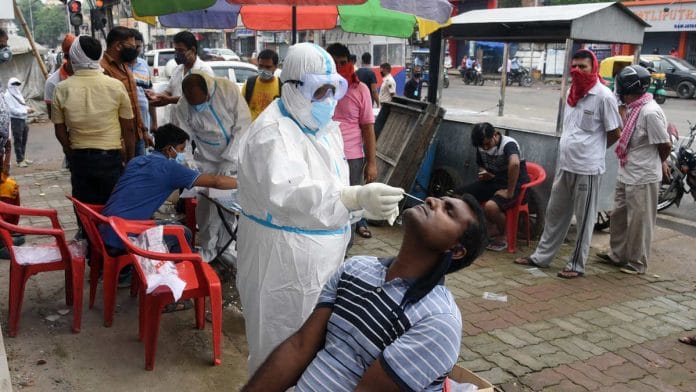New Delhi: Loss of smell has been identified as a symptom of Covid-19, but a group of Indian researchers has suggested that patients don’t lose the capacity to identify or detect all odours.
According to researchers from the National Agri-Food Biotechnology Institute (NABI) Mohali and the Postgraduate Institute of Medical Education and Research (PGIMER) Chandigarh, Covid-19 patients only lose their capacity to detect and identify certain smells.
This hypothesis, derived from a small study comprising Covid-19 patients and a non-Covid control group, forms the basis of a smell test the team claims can help screen for the disease.
The team posted their findings, which are yet to be peer-reviewed, earlier this month on MedrXiv, a portal where researchers share completed but unpublished work.
Talking to ThePrint about the study, Mahendra Bishnoi of NABI said, “We were motivated to contribute in fighting this unprecedented challenge (Covid-19), which was creating havoc all over the globe.
“In early April 2020, with the guidance and approval of our Department of Biotechnology, we started working on this project.”
Bishnoi said the team developed an interest in developing smell tests because of two reasons. “One, there were international reports communicating that smell and taste loss are major symptoms of Covid-19 infection and, two, our ongoing research on the sensory system where we are working on the role of different sensory receptors in our gut in sensing food,” he added.
Also Read: Delhi scientists develop ‘non-fussy’ Covid test, say it’s cheaper & faster than RT-PCR
How the study was conducted
For the study, the researchers designed a prototype smell test using a panel of five different odourants that are common in Indian households.
“Odourants were selected using an online survey where we gave a list of 30 odourants to almost 100 individuals. We asked them which smells are the ones you can identify easily,” Bishnoi said.
Based on their inputs, the team shortlisted five odourants: Coconut oil, cardamom, fennel, peppermint, and garlic.
These odourants were filled in 2 ml tubes and packed into a bag. The study participants were given a response sheet that consisted of a questionnaire on whether they can smell and identify the odourants.
The first study was performed among 49 asymptomatic Covid-19 patients admitted at PGIMER. Simultaneously, 35 individuals without Covid-19 also undertook the test.
In a follow-up experiment performed at the Dhanwantry Ayurveda Hospital in Chandigarh, the test kit included a blank (water) sample. The order of the odourants was also changed to confirm the findings of the first study.
According to the researchers, the study suggested that Covid-19 patients may not lose their smell perception completely, and that smell loss depends on the type of odourant. Why Covid-19 patients can’t smell certain types of odours is a mystery yet to be cracked.
“We observed that, only 6.1 per cent of Covid-19 individuals were not able to smell/identify all five odourants,” the team wrote in their study. As many as 38.8 per cent were unable to smell at least one odourant, while 16 per cent were unable to smell two, they said.
According to the team, only 4.1 per cent of the participants were not able to detect or smell any of the five odourants used in the study.
Among the healthy individuals, all were able to smell the odourants, although 14 per cent misidentified at least one, the team wrote.
The study led the researchers to zero down on peppermint and coconut oil as the two scents most Covid-19 patients were unable to smell.
The team is now working on converting the test into portable kits.
“Now, the concept is in place and there is evidence from our work and recently published other international work that smell tests can work to detect at risk/asymptomatic individuals,” Bishnoi said.
The team, however, noted that the results of the tests can become easily skewed if people are aware of the order in which these odourants are presented to them. So, the team has to come up with a way to randomise these kits, including using different odourants, if possible.
Wider testing of the kits is currently underway to give them their final form.
Bishnoi said the concept can also be employed by people at home.
“They can identify a few smells and can smell them everyday. Any abrupt loss of smell and simultaneous minor symptoms or no symptoms will help individuals isolate and take necessary precautions, even get themselves tested at the earliest point,” he added.
Also Read: 1 in 100 hospitalised Covid patients may get a punctured lung, finds new Cambridge study






